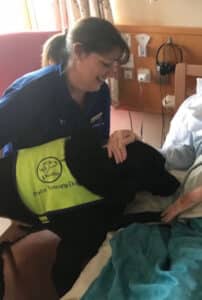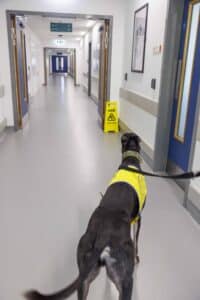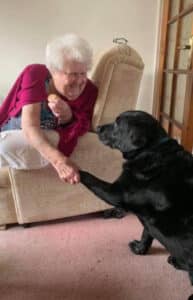
Who are Peata Pet Therapy?
Peata Pet Therapy is a registered Irish charity established in 1996. The charity originated in the 1990s due to the fact that one of its co-founders, legendary Dublin Zoo vet, Mr John Bainbridge was veterinary surgeon to a certain labrador called Cashel who used to reside at Harold’s Cross Hospice in Dublin. This labrador, with no apparent owner, took up residence at Harold’s Cross Hospice and took to his role of visiting all of the hospice residents on a daily basis like a duck to water. When this kindly labrador eventually passed away, Mr John Bainbridge realised that the residents of the hospice sorely missed the labrador’s company, and so, decided that perhaps the void left by this kindly canine could be filled by pet dogs visiting residents, with their owners (of course!), as a unit called a ‘Visiting Team’. And so it was, that Mr. John Bainbridge co-founded Peata Pet Therapy with a number of other founding members with 2 main goals: (1) to provide dog therapy visits to facilities such as nursing homes, hospices, hospitals, Intensive Care Units, Special Needs educational facilities and rehabilitation centres and (2) to educate the Irish public on the health benefits of pet ownership and responsible pet ownership. The name Peata Pet Therapy was simply chosen, as ‘Peata’ is the Irish name for ‘pet’.
Who can get involved with Peata Pet Therapy?
Any member of the public can join Peata Pet Therapy as a ‘supporting member’ for a nominal annual fee. However, dog owners who wish to become ‘visiting teams’ with their canine friends must undergo a short assessment process. As part of the assessment process, dog owners must undergo and pass Garda Vetting and if they will be visiting children under the age of 18, volunteers must also complete the free e-learning Tusla ‘Children First’ certificate and submit it to Peata Pet Therapy’s assessments team. There is also a brief in-person assessment where dog owners must demonstrate that their dog is well behaved, friendly, at ease in an unfamiliar environment and under their owner’s effective control at all times. The assessors are also looking for pet owners who are happy to chat to residents and keep a conversation going, as while the visits are about the dog interaction, the social aspect of the visits is also equally important.
Peata Pet Therapy is always actively seeking suitable volunteers with a caring attitude and their dogs to become ‘visiting teams’ for the ever-expanding repertoire of member facilities requesting Peata Pet Therapy’s voluntary services. The in-person assessment is a once off event if the dog and their owner pass first time, however, Garda vetting will need to continue to be passed every 3 years by volunteers and likewise the ‘Children First’ training is repeated every 3 years, where applicable, and a nominal annual membership fee is paid by each volunteer to cover indemnity insurance costs. Peata Pet Therapy welcomes applications to become volunteers with Peata from adopted dog parents, provided your adopted pet is of a suitable temperament for Peata Pet Therapy visits and at least 1 year of age, for maturity reasons. The welfare and wellbeing of all dogs is of upmost importance to Peata Pet Therapy, so it is crucial that your dog will be happy and comfortable with visiting people it does not know in a novel environment, hence the requirement for assessment prior to becoming a ‘visiting team’. Assessments take place in Harold’s Cross Hospice in Dublin once a month, and in Co. Tipperary regularly based on demand. If you are interested in learning more about becoming a member, please visit the Peata Pet Therapy website.
 What do Peata Pet Therapy do?
What do Peata Pet Therapy do?
Regular Visits:
Once a ‘visiting team’ has passed the assessment process, the dog owner will receive their identity card and their furry canine friend will receive its own logoed Peata Pet Therapy hi-vis jacket. The successful ‘visiting team’ will also now be covered by Peata Pet Therapy’s indemnity insurance to carry out weekly visits at a nominated facility, such as a hospice, nursing home, hospital, Intensive Care Unit, Special Needs educational unit or rehabilitation centre. Peata Pet Therapy, where possible, always tries to match volunteer ‘visiting teams’ to facilities which are near to where they reside or to facilities which the pet owner is keen to visit and in return, volunteers are requested within reason, to commit to a regular schedule of visits at the designated facility. Once the ‘visiting team’ (a member and their dog) has been matched with their facility, they will be put in touch with the facility’s co-ordinator who may arrange for the volunteer to come in prior to visits commencing, so as to familiarise themselves with health and safety procedures within the facility. On arrival for the regular visits, the ‘visiting team’ report to their coordinator at the facility, who then directs the ‘visiting team’ to the day room or to the people who would like a visit that day. The ‘visiting team’ then circulates between the people wishing to be visited that day, chatting and sharing experiences. The length of the typical regular visit depends on the dog, how well they are responding to the visit and how quickly they get tired or bored! Visits may also be weather dependent, and may have to be shortened for the dog’s own welfare, especially on hot and humid days, when dogs can become uncomfortable in the heat.
Occasional Once-off Corporate Visits:
Regular ‘visiting teams’ also get the opportunity to participate in once-off visits to businesses, corporate companies, universities, schools, libraries and even special pet events such as ‘Pups in the Park’. These once-off events are usually by invitation or request from a company or educational institution and they serve to highlight what Peata Pet Therapy does, the benefits of pet therapy and pet ownership. These events tend to centre around the theme of health and wellness in the workplace and in educational settings or if taking place in schools or libraries, the central theme may be around ‘Reading for Fun’ in the presence of a canine companion, or educating the public about the charity. Typically, the company, business or educational institution inviting Peata Pet Therapy to their event will make a reasonable donation to Peata Pet Therapy in return for the visit, and these donations are absolutely vital in raising the necessary funds for the charity to continue functioning.
You can find more information on Peata’s regular or corporate visits and how to organise one on their website.
‘Reading for Fun’ Initiative:
Peata Pet Therapy is also currently in the process of developing a ‘Reading for Fun’ programme for schools which have Special Needs units attached to them. ‘Visiting Teams’ involved in this type of regular visit would be required to have obtained a Tusla ‘Children First’ certificate online before commencing this form of regular visit as it would involve volunteering in educational institutions with children under the age of 18. The idea behind reading for fun, is that it is an initiative which helps children to grow in confidence while learning to read, by reading on a weekly basis to a non-judgemental ‘friend’, in other words, a canine companion in a small group classroom setting. A suitable reading list would be provided to the class teacher, which typically involves educational fiction or non-fiction books about animals, usually stories about dogs, which tie in with the initiative and the reading level of the children participating.
Social Events:
Peata Pet Therapy holds a few social events every year for its members. This includes biannual member dog walks in alternating locations, usually in a suitable location within the Greater Dublin area which tend to be very well attended and are an opportunity for members to get together for a walk and chat, followed by some more banter over some refreshments at a local coffee shop. However, the highlight of the Peata Pet Therapy calendar has to be the annual Peata Pet Therapy carol service hosted by Christchurch Cathedral every year in December, when the Peata therapy dogs get together with their owners for an hour of Christmas carols and a Christmas blessing for the canine volunteers given by the Very Reverend Dermot Dunne, followed by refreshments. This unique event tends to be very popular also with media outlets.
Peata Pet Therapy’s Educational Endeavours:
Besides the pet therapy visits which Peata Pet Therapy organises, the other aim of Peata is to educate healthcare professionals and the public on the health benefits of pet therapy, the mutual benefits of pet ownership and responsible pet ownership. This is mainly done through their website and social media platforms, Facebook and Instagram, but also through speaking at events and via answering direct enquiries. However, Peata does on occasion also directly engage with schools, e.g. for Transition Year Projects.
 How are Peata Pet Therapy funded?
How are Peata Pet Therapy funded?
As a small Registered Charity, Peata Pet Therapy receives no government funding. To function as a charity, Peata Pet Therapy therefore relies on the annual nominal membership fees paid by supporting members and visiting team members, fundraising, legacy gifts through wills, and sponsorship. Any funds raised go towards the running costs of the charity which include indemnity insurance for ‘visiting teams’ and logoed ID for volunteers and uniforms which identify Peata Pet Therapy dogs plus the usual external costs of running a charity. Everyone within Peata, including board members, are unpaid volunteers, nevertheless, they are heavily reliant on fund-raising to keep the charity going, and like many other charities, Peata Pet Therapy was significantly impacted by the COVID-19 pandemic.
 The Mental and Physical Health Benefits of Pets:
The Mental and Physical Health Benefits of Pets:
Pet therapy and pet ownership can have many mental health and physical health benefits, including but not limited to:
- Prevention of Loneliness: Pets can provide us with companionship, social support and joy, thus helping to prevent loneliness and depression.
- Improve Cardiovascular Health: Pets can be good for your heart. Any pet that encourages their owner to take more exercise can improve your heart health. Owning a pet or even just being around animals also can significantly reduce stress and keep us calm, which in turn can reduce blood pressure and aid in keeping your heart healthy. For people who live alone, research has found that dog ownership can reduce the risk of death from cardiovascular disease by 36%.
- Reduce Stress: Pets can have a great calming effect on their owners. The very act of petting or stroking your pet can have a significant calming effect, like hugging another human being. Also, if you own a pet that you have to exercise or walk, this gets us out into the fresh air, closer to nature and spending time with your pet can often put worries into perspective.
- Helping us to Cope with Crisis Situations: Pets tend to have a calming effect on their owners. Your pet won’t understand the exact reason that you are in crisis, but many pets can read their owners emotions and respond accordingly. Pets tend to be very loyal to their owners and its that undying support, love and loyalty that can help to calm us and put things into perspective.
- Encourage Exercise: Pets that encourage us to exercise can improve our mental health, our cardiovascular (heart) health, our fitness levels and our joint health. By encouraging us to exercise, pets can also reduce the likelihood of their owners developing diseases such as obesity or diabetes and lessen the severity of some medical conditions.
- Improve our Sociability: Pets can get us out of the house, making us more likely to meet other people, help us to initiate conversations and create a sense of belonging. And in the case of Peata ‘Visiting Teams’, our canine volunteers bring their owners to places they might not otherwise typically visit, to meet and start up conversations with people who share their interest in dogs, but because of their circumstances may not be able to keep a pet of their own.
- Provide us with Unconditional Love: No matter what else is going on in your life, one thing is certain, your pet will shower you with unconditional love and affection which is an amazing mood booster.
- Create Happiness: Being a pet parent can be a very rewarding experience, can create many wonderful memories and help us to be more content in ourselves.
- Improve Seniors’ Cognitive Function, Memory and Social Interaction: Owning a pet can improve cognitive function and reduce cognitive decline associated with aging. In the case of Peata Pet Therapy visits, the conversations may be happening between the humans in the room, but the dogs create a focal point of interest, a talking point around which stories and experiences can be exchanged. Residents, staff and attendees at the facilities that Peata Pet Therapy ‘visiting teams’ visit, tend to really enjoy and look forward to the weekly visits and genuinely miss the ‘team’ if they cannot visit. People with dementia may find that caring for a pet can boost self-esteem and independence.
- Help Children through Animal-Assisted Therapies: Pets can help children who have suffered or are suffering from abuse through animal-assited therapies. Research shows that children who have suffered abuse can in turn, grow up to become abusive, neglecting parents themselves and they can be deeply distrusting of adults. Along with psychotherapy, animal-assisted therapy can really help abused children through the recovery process.
- Release ‘Happy Hormones’: Studies have shown that pets can help us to release our ‘happy hormones’ which calm us. This may be particularly helpful for individuals suffering from dementia. Pets can improve our confidence in ourselves and our overall quality of life, whether we own a pet or get regular visits from a pet and this is another benefit of therapy dogs and assistance dogs visiting care homes.
- Help us to Sleep more Soundly: Our pets, such as dogs and cats can induce us to produce oxytocin, a hormone that can help to reduce stress and anxiety, which in turn creates a more relaxed state which is more conducive to falling asleep. Sleeping in the same room as your pet can lead to you waking up more refreshed in the morning. Pets sleeping in the same room as their owners can also provide a sense of security which can improve the duration and quality of sleep.
- Can sometimes Detect Diseases: Some pets, due to their incredible sense of smell, can detect certain diseases such as urinary tract infections and certain cancers, though some animals are better at this than others, and ability to detect disease can vary between breeds, so while its an interesting fact, it cannot be relied upon.
- Help us through the Grieving Process; Pets can boost your mood and alleviate feelings of anxiety. They also improve feelings of social support. Pets can provide us with comfort and emotional support and reduce feelings of grief, anger and stress. Pet owners are less likely to feel lonely than people who do not own pets.
Peata dogs are experts in smile therapy. For further information about Peata Pet Therapy and their work you can visit their website or connect with them on Facebook or Instagram. You can also support the work that they do here.

 What do Peata Pet Therapy do?
What do Peata Pet Therapy do? How are Peata Pet Therapy funded?
How are Peata Pet Therapy funded? The Mental and Physical Health Benefits of Pets:
The Mental and Physical Health Benefits of Pets: 
